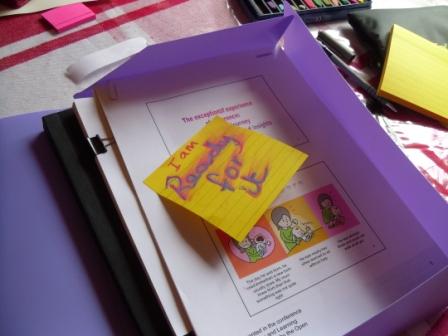One of the requirements for certain advanced degrees is often an oral examination. This examination normally occurs after the dissertation is finished but before it is submitted to the university, and may comprise a presentation by the student and questions posed by an examining committee or jury. In North America, an initial oral examination in the field of specialization may take place just before the student settles down to work on the dissertation. An additional oral exam may take place after the dissertation is completed and is known as a thesis or dissertation “defense,” which at some universities may be a mere formality and at others may result in the student’s being required to make significant revisions. In the UK and certain other English-speaking countries, an oral examination is called a viva voce. (Source: Wikipedia)
My Viva Voce will happen very soon, and as most of other candidates at this stage of the process, I am feeling a mix of excitement and anxiety. I shared my feelings with a close friend who is also completing her Ph.D soon, I had this magnificent response, which I thought it would be worthy sharing here, as she agreed with its publication.
From: Kalina Lima
Sent: 19 May 2011 14:57
To: Vinha M.H.G.
Subject: viva voceNene,
If you want :
1. we can meet and you go over your notes as if presenting the thesis to me, rehearsing the viva. I can, if you want it, go over some of the questions M*** emailed to you.
As you rehearse you release a lot of the angst and stress. Listening to your own voice helps you visualize yourself having the official viva. I always do it. Throughout the rehearsal, we clear our mind and get rid of irrelevant information and words.
2. I strongly suggest you take some walks these days, the pace you like it, just to breath in and out, and relax. You’ll be surprised how beneficial it will be for you. Wherever you like to walk, at that park on the way to the school, at the common, wherever.
If you want, you can one day – Tuesday? – drop the kids off at the school and come by and we walk at the common, slow pace, and then talk about the thesis.
Think about it and we find time to meet up. The rehearsal I think can even be twice. If you want it, we can have coffee tomorrow morning and we tell me from top of your head. . . then you have the weekend to think it over and reflect on how you’re performing.
You’re almost there. Just identify the final tiny preparation to make you feel less nervous. A little nervous is so normal. Don’t fight it. Just try to relax enough to operate properly.
Count on me.
Love you,
Maroca
Note 1:
Kalina’s blog: The Soton Times
Note 2:
In the United Kingdom, the viva voce involves two examiners (one internal and one external) and the candidate. The internal examiner is an academic from the candidate’s own university department and the external is from another university. In my university, the examiners are chosen by the candidate in accordance with the supervisor and with the approval of the university. The viva voce, usually shortened to Viva, is a private examination, which is witnessed only by the candidate’s supervisor. According to Wikipedia, in Portugal and Brazil the PhD thesis “is presented for defense in a public exam. The exam typically extends over 3 hours. The examination board typically involves 5 to 6 Professors or other experts with a PhD degree (generally at least half of them must be external to the university where the candidate defends the thesis, but may depend on the University). Each university / faculty defines the length of these documents, but typical numbers of pages are around 60–80 for MSc and 200–250 for PhD”.
